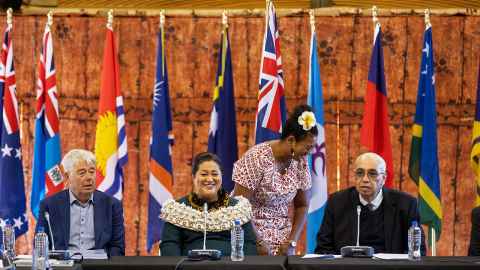Visiting delegation reaffirm shared commitment to Pacific success
23 October 2025
University of Auckland strengthens its ties with the University of the South Pacific.

Waipapa Taumata Rau, University of Auckland hosted a delegation from the University of the South Pacific (USP), reaffirming a shared commitment to Pacific education, research and student success.
The meeting on 21 October focused on breathing new life into the existing Memorandum of Understanding (MoU) between the two institutions and exploring innovative ways to support Pacific learners across the region.
USP Pro-Chancellor, Chair of Council and Acting Vice-Chancellor, Siosiua Tuitalukua Tupou Utoikamanu, says the meeting with the University of Auckland was a great opportunity, strengthening connections and looking to ensure student success for Pacific peoples.
“I’m very grateful for the opportunity to be here, to learn more about the programmes targeting our Pasifika students, we’re looking forward to learning what we can that will be useful for USP.”
Waipapa Taumata Rau, University of Auckland’s Pro Vice-Chancellor Pacific, Professor Jemaima Tiatia-Siau, says the meeting also highlighted the alignment with the University’s Pacific Strategy Ala o le Moana: “This meeting is about breathing life into our meaningful, purposeful MoU with USP and Waipapa Taumata Rau. It’s also about activating Ala o le Moana, our Pacific Strategy, and nurturing innovative ways of supporting our learners. Sharing ideas and enhancing our relationship is key.
“We need to engage and share regularly to identify potential opportunities and also capitalise on our existing work together.”
Walter Fraser, Chief Operating Officer at USP, emphasised the significance of the partnership: “We look to the University of Auckland as a key partner – not just in terms of our shared interests around Pacific research and how we engage with our wider Pacific, but more importantly as an institution that’s important in our part of the world.”
Fraser says building and strengthening the special partnership was key to looking ahead to the future, ensuring collaboration that addresses shared regional responsibilities. He says USP sees this partnership as vital for tackling challenges and unlocking significant opportunities for Pacific peoples.
I’m very grateful for the opportunity to be here, to learn more about the programmes targeting our Pasifika students.

The talks also spotlighted practical pathways for Pacific and Māori student success. University of Auckland’s Apollo programme manager Steve Watkinson spoke about creating confidence for students transitioning from secondary to tertiary education as they entered the Faculty of Engineering and Design.
“The more students we can have knocking on the door at the secondary level, the more we foster understanding and belonging. That sense of belonging encourages students to move into decision-making roles of power and influence, filtering down for generations to come.”
Atkinson, who works closely with engineering pathways, stressed the importance of early preparation: “We need to strengthen the work already done in secondary schools and allow students to get more practice with prerequisites for engineering. Two identified subjects that are sticking points are calculus and physics. Familiarity breeds confidence – running the programme on campus, letting students sit in big lecture theatres and building networks before day one makes a huge difference. That first year is tough, but a problem shared is a problem halved.”
University of Auckland’s associate director of Schools and Community Engagement, Liletina Vaka, emphasised the need to explore opportunities together, and sharing the learnings from working with school leavers from the past five years.
“Pacific success is not just success for Aotearoa, but also our place in the Pacific. Today has been about sharing knowledge, insights, and exploring opportunities to partner both now and into the future.”
The meeting concluded with a shared vision: strengthening educational pipelines, enhancing research collaboration, and ensuring Pacific learners thrive across the region.